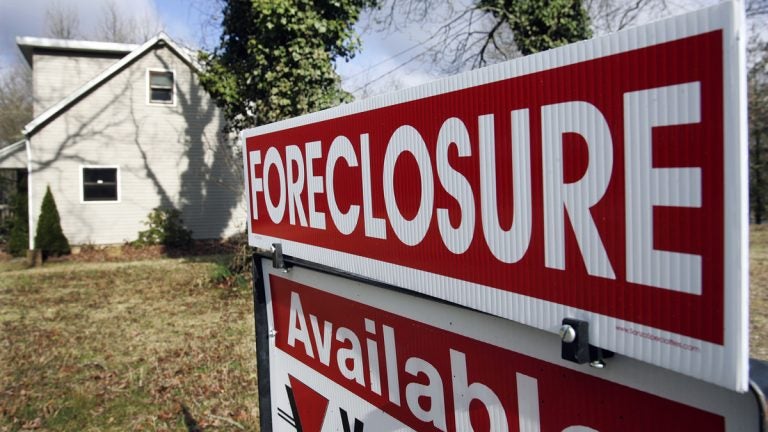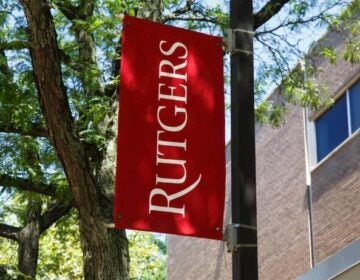More than 600 underwater mortgages on the Jersey Shore to be refinanced by non-profit

A foreclosure sign in Egg Harbor Township, N.J. (Mel Evans/AP Photo)
Buoyed by progress in helping struggling homeowners in the Newark area, a nonprofit housing group has cast a wider net for underwater mortgages in counties still trying to recover from Hurricane Sandy.
This month, representatives of New Jersey Community Capital are reaching out to homeowners scattered down the eastern side of the state, notifying them of what could be a big change for the better in their mortgages.
Using capital raised from private lenders, NJCC bought a pool of 651 mortgages from the Federal Housing Administration from Bergen to Cape May. The federal government designated the nine counties covered as priorities for Sandy relief.
Instead of bidding on mortgage portfolios at auction as it has previously, NJCC went directly to the FHA seeking to acquire troubled mortgages, said Wayne Meyer, president of the community development financial institution. To do so, it paid the agency a premium of about $6 million over the likely auction price, he said.
The goal was to target the pressing need in some neighborhoods and communities struggling to recover from the giant storm, Meyer said. That way, the mortgage relief dovetails with other federal aid, such as the Rehabilitation, Reconstruction, Elevation and Mitigation (RREM) program administered by the state, he said.
Besides their location in storm-struck areas, the mortgages have two things in common, according to Meyer. The borrowers are in default and their loans are higher than the value of the homes. The program is limited to mortgages in the pool, with current borrowers given the chance to decide whether to participate.
“The outstanding loans are about $268,000 on average, and the market value of the homes is about $186,000,” Meyer said. “Our goal is to offer new mortgages at market value, to keep as many people in their homes as possible.”
Some of the houses “were very severely damaged” by Sandy, and some occupants moved out with foreclosure seemingly imminent, he said. NJCC did its own due diligence, “we actively went out to every house,” he said.
An Understandable Skepticism
In some cases, though, a bit of detective work is needed to reach the borrowers, he said. And in a time of paper shuffling by bankers and too-good-to-be-true offers by scammers, some potential beneficiaries greet the program skeptically, Meyer said.
Although the properties vary widely, many of the mortgages date to 2004-2005, he said, a short time before Wall Street’s housing bubble burst, the Great Recession hit and property values plunged. The borrowers continued paying for a time, but eventually fell behind, with an average 34-month delinquency, he said.
When the hurricane piled onto the stress of financial uncertainty, the result caused some homeowners to throw in the towel, Meyer said. That is something he has seen previously, as “some people I’ve made (modification) offers to have decided they’d rather leave,” he said.
Still, “our goal is to modify at least 50 percent of mortgages on the owner-occupied units to a level where the people who want to stay can keep their homes,” Meyer said. He acknowledged that is “a huge goal” in a period when financial institutions have managed 10 percent or less.
“We’re hitting the ReStart button, giving people a second chance,” said Jennifer Murphy, NJCC’s director of housing programs, working the initiative’s name into the conversation.
This round has particular resonance for her, because Sandy destroyed her Brick Township home. “I was lucky that mother took me in,” Murphy said, and more than a year later, she is still trying to rebuild.
So one of her messages for NJCC’s pool of struggling borrowers is that this is one program that might be easier than they think. While the organization needs to cover costs and repay its lenders, “we don’t need to make a profit,” she said.
As proof, she points out that the ReStart mortgage initiative already has a track record. A year earlier, NJCC bought at FHA auction almost 400 troubled mortgages in Essex County and the Tampa, FL, area, and followed by offering loan modifications down to 100 percent of market value or 30 percent of gross income, according to Meyer.
When examining the loans, NJCC found that mortgage modifications could work — even for many people with current low incomes, Murphy said. “I have borrowers who just have Social Security, but they still qualified” for the program once the loans were reduced to market values, she said.
While most of those modifications are working out, the NJCC officials acknowledge they have learned some lessons they are applying in the new round.
For one thing, New Jersey has proved tougher than Florida, Meyer said. One reason is that along with lower housing values, many Florida borrowers carried low debt loads, he said.
Another factor came as a surprise, he said. The organization viewed the prevalence of multi-family units in Essex County as an attraction, a way to keep more people housed. Instead, it has provided unexpected complications in restructuring mortgages, according to Meyer.
“We thought that would be an advantage, that even if the homeowners lost jobs they would still have rental income,” Meyer said. “Instead, we found that tenants also lose jobs or income and get behind on rent, compounding the problem.”
That was the case for Karla Roach of West Orange, whose father suffered a debilitating illness that interrupted his contracting business. At the same time, the recession hit his tenants, who stopped paying rent, she said.
The family tried to work with the mortgage holder, Bank of America, and even hired a lawyer to negotiate a modification, Roach said. The mortgage terms seemed workable when they bought the house on Main Street about eight years ago, but things changed, she said.
“In the beginning it was all right, but then taxes went and the interest rate went up after a year and a half,” Roach said. “It’s very frustrating trying to deal with the bank, because even when you submit all the paperwork, every week or two there’s something new that they want.”
Their attorney made little headway with Bank of America, but advised them to stop paying on the mortgage when the bank started trying to take the house, she said. “Many people are in the same situation,” Roach said, but then her family got lucky.
They were contacted by La Casa de Don Pedro, a Newark community development corporation, one of several around the state that provides housing counseling for NJCC. From there, the agencies moved swiftly to modify the mortgage, Roach said.
“My father is better, he’s happy and he’s now able to afford the mortgage,” she said, adding she hopes to take over the business when he retires.
As they deal with a wide range of properties in the new round, the NJCC officials are hoping for similar outcomes. After all, many of the homes and borrowers in places like Toms River and Smithville seemed solidly and safely middle-class before the double whammy of recession and storms.
But that is true even of Newark participants, Murphy said. NJCC has written down mortgages there by as much as $320,000 after the precipitous drop in values, she said.
With a long-time job as a toll collector, Newark resident Irene Crawford has been in her Lanark Avenue house for 17 years. She was able to take in her grandfather, now 92. But public sector cuts have contributed to New Jersey’s slow recovery from the Great Recession. Crawford’s finances faltered when she was forced to take a $15,000 pay cut along with her fellow toll collectors.
Her mortgage with Bank of America was not a bad deal, “I just had a lot of things in my life that went wrong,” Crawford said. That included hiring a law firm to supposedly work on a mortgage modification, money she considers gone. As for the bank, it simply “led me on,” she said.
But if the bank never gave Crawford a chance at a modification while it held the mortgage, it did refer her to La Casa after NJCC acquired it, she said. She contacted the agency and at the end of July, and by September had a new deal in place with NJCC.
“From what I can see now, we’re going to be here for a while,” Crawford said. “I don’t have to wonder. ‘What am I going to do with Grandpa?'”
_______________________________________________
NJ Spotlight, an independent online news service on issues critical to New Jersey, makes its in-depth reporting available to NewsWorks.
WHYY is your source for fact-based, in-depth journalism and information. As a nonprofit organization, we rely on financial support from readers like you. Please give today.




